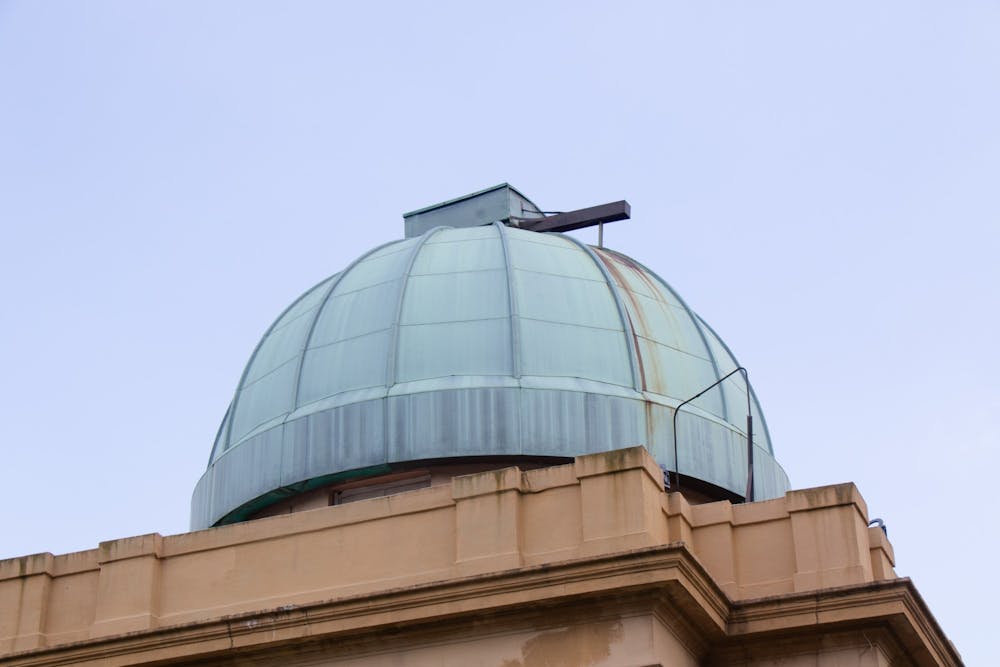USC's Department of Physics and Astronomy offers opportunities to gaze at the stars in Melton Memorial Observatory or to learn more about the universe in its various lecture series throughout the year.
Melton Observatory provides an approachable experience for those that want to look at the night sky, while also offering a rich history and valuable community experience that brings locals and students together.
Built in 1928, the observatory is a memorial for William Melton — USC’s president from 1922 to 1926. While he was alive, Melton pushed for the observatory to be built but died in 1926 before construction was finished.
“(The donor) dedicated it in memorial to Dr. Melton, that’s why it’s called the Melton Memorial Observatory," Martin Bowers, director of the Melton Observatory, said.
The observatory houses a 16-inch Cassegrain telescope that Bowers uses to capture video sequences that he posts to Melton Observatory's Facebook page.
“This scope does really well on planets because it has a really long focal length” Bowers said.
While Saturn and Jupiter are among his favorite planets to look at, Bowers said Mars will be great this year as it reaches opposition — the time when Mars will be at its brightest and closest to Earth — in December.
All the events that the Department of Physics and Astronomy hosts are important staples in the community for experts as well as amateurs, such as Melton Observatory goer Pam Redfield.
“I think it’s an incredible experience for people to see the universe, and we are so isolated here,” Redfield said. “Many a times we forget that the world is much larger than just us.”
As an amateur astronomer, Bowers enjoys sharing his knowledge with the Columbia community and those that come out to stargaze and look through the telescope. This fellowship continues to remind him why he works at the observatory.
“It’s a beautiful universe in which we live, and it’s part of the fun is experiencing the universe,” Bowers said. “It’s why I took this job, to share that, and to work with this beautiful old instrument.”
The historic Melton Memorial Observatory hosts viewings of the night sky every Monday night, from 9 p.m. to 11 p.m., weather permitting.
Beyond the observatory, the Department of Physics and Astronomy offers the Public Lecture and Colloquia series that present a range of scientific topics with varying skill levels.
The Public Lecture Series was launched in 2016, sponsored by the Office of the Provost, the Office of the Vice President for Research and the College of Arts and Sciences. At each lecture, invited speakers present different topics at a level approachable for any interested undergraduate student.
“The hope is to bring a broad audience together for these scientific talks, so that everyone from a middle schooler all the way up to a senior citizen and try to give talks to a non-science audience in a way that they can understand it,” Sam Beals, student services coordinator for the Department of Physics and Astronomy, said.
Prior to COVID-19, the auditoriums where the lectures took place drew a crowd of 300 to 500 people.
"We had to relax a lot of that during the heat of the COVID period, but we're hoping to ramp those up again here in the near future," Beals said. "Those are a lot of fun."
As of right now, the Department of Physics and Astronomy are hoping to relaunch the Public Lecture series with new speakers in the upcoming months.
Another open lecture series, the Colloquia began in 2018. This series offers a deeper perspective that speaks more to physics and astronomy research advancements while the Public Lecture series is designed to give more accessible understanding of these topics.
“This is an effort to really draw in the broader community, both locally here in Columbia and throughout South Carolina,” Beals said.
The next Colloquia will be this Friday, June 17, from 10:30 a.m. to 11:30 a.m., featuring Garett Darl Lewis. More details can be found here.

